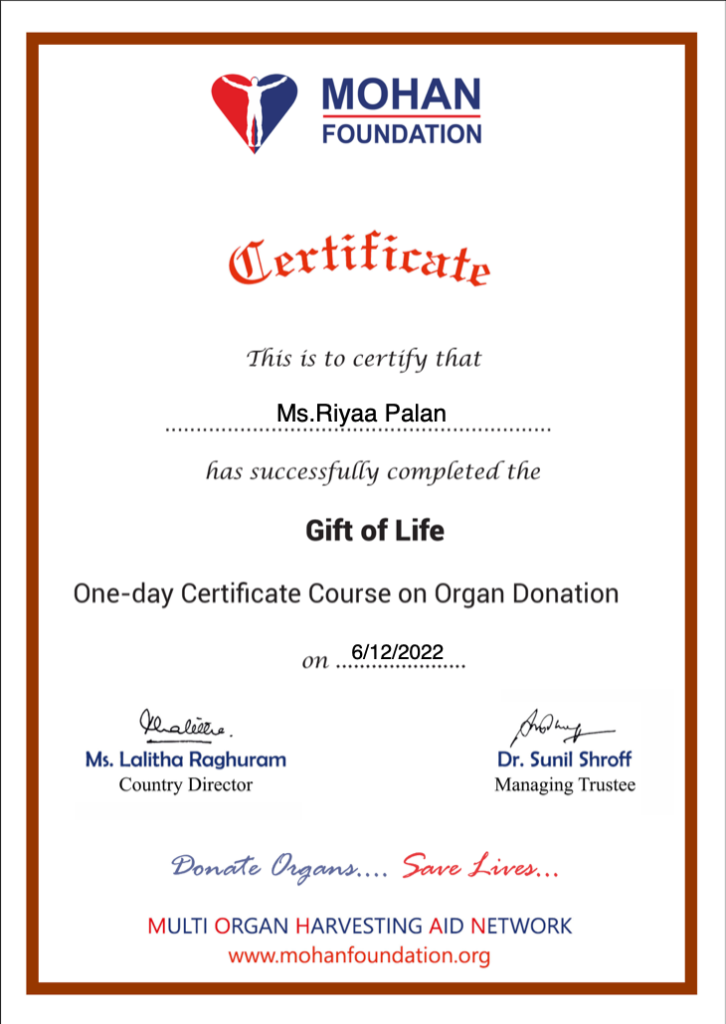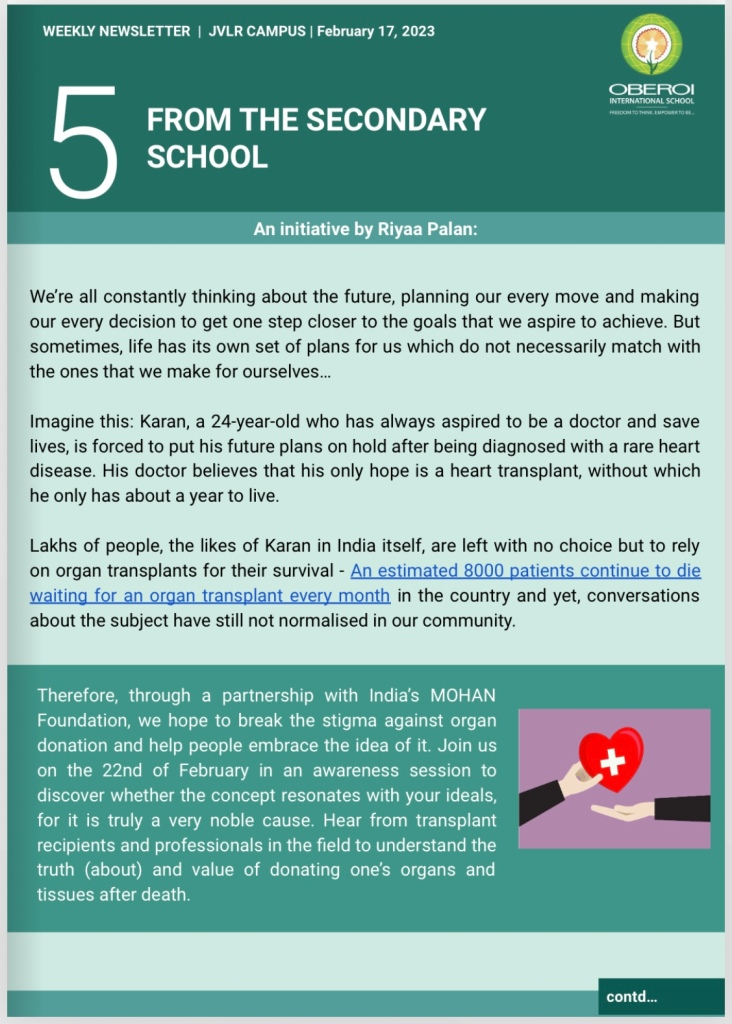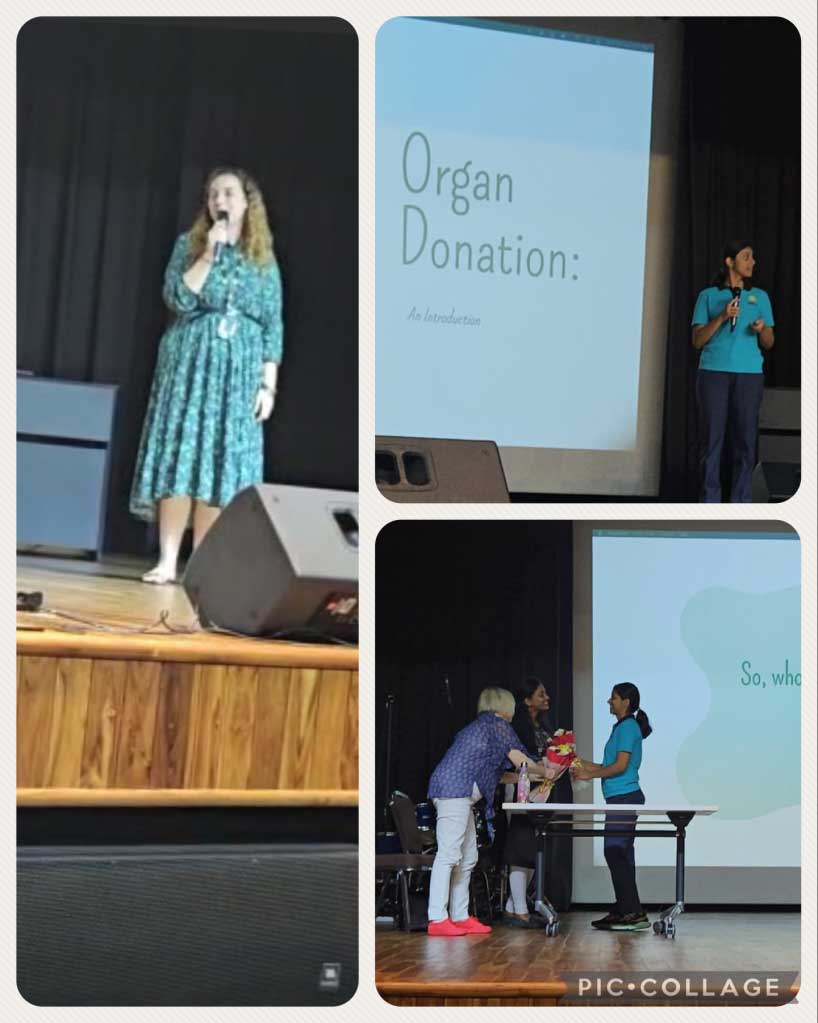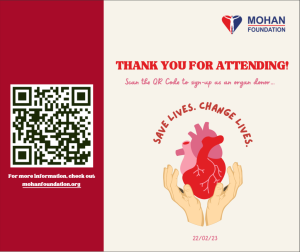
About:
Ria wanted to become an organ donation ambassador because she witnessed the direct detrimental consequences that those suffering from organ failure must cope with each and every day. Her aunt in India, who had to undergo dialysis three times a week, and who has been waiting for a kidney transplant for over 6 years now, motivated her to take action for her and all the millions of people waiting for life-saving organs. Ria founded the TRIO Youth Ambassadorship for Organ and Tissue Donation Awareness to inform community members of the lifesaving power of registering as an organ donor. Ria believes that by sharing personal stories, she can inspire people to join the registry so she started a podcast. She will be attending an 8-year BS/MD program in college to become a transplant surgeon and hopes to continue advocating for increased awareness of organ donation.
From the 'Perspective' of an Organ Donation Ambassador...
Generally, I prefer starting my blogs with a quote or a personal anecdote but for this report, I thought it would be best to start with the truth instead…If I’m being honest, I have procrastinated writing about my experience as an ‘organ donation ambassador’ for quite a while – Probably because it has been struggling to compete with other tasks on my ‘To-do’ list.
But that’s the thing. I should never have perceived it as ‘work’ in the first place, especially because as a responsible citizen, it is my duty to contribute to the welfare of society. And so, by admitting my truth, the point I’m trying to make is the fact that it is, in turn, our perception of the world that affects the choices we make on a daily basis.
To further explain this with an example, we can take the idea of organ donation itself – It has long been considered a ‘taboo’ in our country since it involves thinking beyond our comfort zone, beyond our little safety bubble. Yes, as humans, we have a natural obsession with the future but it is the distant future that we sometimes, consciously as well as subconsciously, neglect.

The thought of what happens ‘after’ scares us due to which, the concept of organ donation is often perceived as morbid and sometimes, even as a sacrifice. Yet, that is only one way of looking at the scenario because in reality, it is a life-saving act. And even as donating one’s organs might be a sacrifice for the donor, it is also an invaluable gift of life for the recipient at the same time.
So, when I decided to be a voice for this cause, my only aim was to transform the way our community perceives organ donation as a whole – There was no guaranteeing that my efforts would pay off but people would, at the very least, be motivated to consider signing up as organ donors (which is a step-up from the neglect that the subject widely receives).
Having had a history of organ donation in the family itself, my parents were already tied-up with India’s MOHAN Foundation as potential donors in the future. They had been aware of the concept but it was actually the demise of my grandfather (who donated his eyes, liver and kidneys himself) that inspired them to sign-up for the cause as well. So, with the guidance of MOHAN Foundation’s director, Miss Jaya Jairam, I was able to complete its ‘organ donation ambassador’ course to be eligible to conduct awareness sessions in our community.
For those of you who might be interested to take up the same, the course comprised three segments: The first module was quite content-heavy since it covered all the technicalities related to the process of organ donation – So, if you’re naturally a ‘bio-lover’, you will surely be intrigued by the science behind it. Furthermore, the second stage mainly involved interacting with experts and professionals in the field to expand our knowledge on the topic. This session was especially insightful because we also heard the first-hand accounts of transplant recipients.

As for the third and final stage, it basically requires the learner to implement their learning in any artistic form of their choice – for example, a painting, a skit, or a poster – as a part of their awareness campaign. I chose to communicate my knowledge about the subject by conducting awareness sessions about organ donation for the teachers and parents in my school community.
In hindsight, planning the event was a little tedious with all those approvals required at different levels and the invitations and the rehearsals…I could give you a list and even then, I would probably have missed out on some of the challenges – But when you have great aspirations, you also need to be willing to work towards them so that is exactly what I did.

However, there were times when it got too much to handle, yet I continued to remind myself that my efforts would perhaps, one day, lead to someone (and their family) getting a second chance at life. There’s also a quote from one of the series that I’d watched – “The beauty is in the attempt” (One Tree Hill) – which inspired this mindset of mine.
Nevertheless, in the end, I was able to successfully conduct consecutive awareness sessions with the support of my parents and teachers. Though if I’m being honest, there were times when my expectations for the audience capacity strayed a little too much from reality – Initially, I had also addressed a group of about 70 teachers (at school) because of which I was hoping to address a large audience in my latest session.
This is when I knew that I needed a reality check – Life, in general, in the city is busy and sometimes it so happens that you can’t make it to every place you’d want to be. There were so many people who wanted to attend the session but couldn’t due to prior commitments and even though they weren’t present in person, their good wishes really helped boost my confidence.
Later, I also realized that it wasn’t only my knowledge that was tested during the session – It was also my ability to communicate with my audience, to empathize with them, and to convince them of the goodness of the cause. Moreover, in comparison to Spain’s 50 PMP or the US’ 36 PMP, India still lags far behind at an organ donation rate of less than 1 PMP (per million population). This is also part of the reason why it is important to encourage conversations around the subject, whether it is just a single person you’re addressing or an entire community.

“I once conducted a session where there was only one attendee”, Miss Jaya told me shortly after my session. She didn’t have to elaborate any further for me to understand that the size of your audience does not matter as long as your vision is clear.
In my case, I do have a vision. And the spirit it needs in order to be achieved. Throughout this experience, I also learnt the importance of patience because such changes cannot be made in a day. Or by one person – It takes an entire community. It takes a ton of effort. More importantly, it takes a lot of resilience.
All of which, I’m willing to give as long as it counts. As long as it makes a difference.

For those of you who might want a glimpse of the awareness session, here’s a short compilation for you to view:
– By Riyaa Palan
